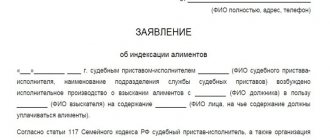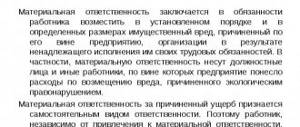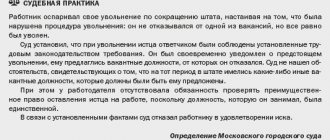Description and types of penalties
All employees are obliged to bear punishment for violating the rules of labor discipline established in the organization, as well as in the provisions of the job description and the contract with the employer. The Labor Code of the Russian Federation stipulates that the reason for bringing a citizen to penalties is the commission of an offense, as this proves his neglect of official duties. As a punishment, the employer may apply one of the following measures to the specialist:
- rebuke;
- comment;
- dismissal.
All of these types of disciplinary sanctions are enshrined in Article 192 of the Labor Code of the Russian Federation. The most common reasons for their use are:
- Partial or complete failure by a specialist to fulfill the production duties assigned to him, established by the employment contract.
- Disclosure of commercial or state secrets that became known to the employee as part of his work activities.
- Failure to comply with discipline rules, for example, multiple tardiness, absenteeism, appearing at the workplace in a state of intoxication.
The employer has the right to deprive bonus payments of citizens who have committed misconduct. But the employer must take into account that any penalties not specified in the employment contract are considered illegal.
Oral or written comment
Most often, a reprimand is used as a sanction for committed violations of discipline. This punishment is imposed for minor offenses that do not cause damage to the enterprise, or for violation of disciplinary rules that do not have serious consequences. But in order for the issuance of an oral or written remark to be considered legal, the employee must be familiar with his job description upon his signature at the time of hiring.
Before issuing an order to impose a disciplinary sanction, the manager is obliged to request an explanatory note from the employee. The employee is given two working days to draw up the document. In it, the citizen is obliged to provide evidence of his innocence or describe the circumstances of the commission of the offense, as well as report the existence of reasons justifying his behavior.
There is no list of valid reasons in the Labor Code, but practice shows that employers recognize the following reasons as such:
- lack of necessary materials and tools;
- illness of a specialist or a member of his family;
- violation of the conditions of production activity by the employer himself.
The presence of a valid reason exempts a citizen from disciplinary liability. In addition, if the offense was committed once and is not a gross violation, then the manager has the right to give the employee a verbal reprimand, for example, in case of being late for work.
If the reason indicated by the specialist in the explanatory note is not considered valid, then the head of the enterprise must issue an order to reprimand the employee for a disciplinary violation. The employee should be familiarized with the document upon signature. If he refuses to sign the order, then an appropriate act must be drawn up regarding this fact.
The reprimand is valid for one year from the date of the violation, but it can be removed earlier. The reasons for this are:
- employer initiative;
- a request from a specialist in writing sent to the manager;
- union petition;
- petition from the immediate superior.
Although reprimands are issued for minor offenses, receiving several such punishments within one year can lead to more serious penalties such as a reprimand or dismissal.
Reprimand
The legislation of the Russian Federation does not establish for which violations a reprimand should be issued, but in practice such a penalty is imposed either for repeated minor offenses or for one of moderate severity. Such violations are considered:
- absenteeism;
- failure to comply with safety regulations;
- failure to fulfill the obligations established in the employment contract;
- systematic delays;
- refusal to undergo a medical examination;
- damage or shortage of material assets;
- other offenses.
The process of bringing an employee to disciplinary liability is carried out by issuing an appropriate order. But it should be noted that punishment cannot be imposed for an offense more than six months have passed since its discovery. The Labor Code prohibits applying two penalties at once to an employee for one violation, provided for in Art. 192 Labor Code of the Russian Federation. Comments with changes in 2017 suggest that before issuing a reprimand, the employer should limit himself to a remark if the offense committed was minor.
To legally issue a reprimand, a certain procedure must be followed. First of all, the employee’s immediate supervisor is obliged to send a report to the head of the enterprise describing the fact of violation of discipline. This document must contain the following information:
- date of incident;
- description of the offense;
- names of the employees involved.
A notice must then be sent to the offender requesting an explanatory note within the next two weeks.
One copy of the document is given to the employee, the citizen must sign on the second to confirm the fact of transfer. According to the comments to Articles 192 and 193 of the Labor Code of the Russian Federation, an employee is not obliged to explain his misconduct, therefore his refusal to write an explanatory note is not considered a violation. If a reprimand is issued, information about it is entered into the employee’s personal file, but this information is not indicated anywhere else. If within a year after receiving the punishment the citizen does not commit new offenses, then the penalty will be considered extinguished. You can remove the reprimand early. To do this, you should submit a written petition to the management of the organization on behalf of the employee and his immediate supervisor.
Dismissal of the violator
This punishment is applied only for the most serious offenses. An employer needs to take into account that dismissing an employee is a manager’s right, not an obligation. In this regard, before applying a penalty measure, it is necessary to weigh all the circumstances of the incident, because there is always the possibility that the offender had good reasons for the offense. In this case, a more lenient punishment may be applied. If the manager decides to fire an employee, then he needs to record the following facts:
- several cases of violation of discipline rules established in the organization;
- a single serious offense, such as truancy or theft.
The process of bringing the guilty party to recovery should be documented. It is important to support the fact of misconduct with written testimony from eyewitnesses, as well as the relevant act and report of the immediate supervisor. The employee must be asked to provide a written explanation of the offense he has committed, giving two working days to draw up the document. The recovery is drawn up in the form of an order, which must be read and signed by the specialist.
Based on these documents, an order is issued to terminate the employment relationship with the employee. When using dismissal as a measure of influence on a violator, mistakes are unacceptable, so you need to read the comments to Art. 192 and 193 of the Labor Code of the Russian Federation, in which disciplinary sanctions are considered in most detail.
On the last working day, the employee must receive the final payment, that is, wages for the period worked and all required compensation payments, as well as a work book in which a corresponding entry on the reasons for dismissal is made, indicating an article of the Labor Code.
Who can be held financially responsible?
Financial liability and a fine are not at all similar concepts; they have different grounds. If a fine is a one-time monetary penalty for a misdemeanor, then financial liability is financial compensation for damage to the organization’s property. An employee who damages the condition of the employer's property may be subject to compensation.
The exact amount of payment is determined voluntarily or under duress. The maximum amount should not exceed monthly income. Thus, only the maximum amount of not a fine, but monetary compensation for damage under the Labor Code can be determined.
Application procedure
When bringing a citizen to disciplinary punishment, it is necessary to follow a certain procedure. It consists of several stages:
- Drawing up a report and act on the fact of the offense.
- Inviting the employee to provide management with a written explanation of the reasons for the violation. If the employee refuses to comply with this request or does not submit the document within two days, this is recorded in a report drawn up in front of witnesses.
- The employer, after assessing all the circumstances of the incident and the evidence presented by the employee to justify his action, decides the issue of his guilt. If a citizen is found guilty, the employer chooses a penalty for him, which must correspond to the severity of the guilt. It should be borne in mind that lack of evidence does not give the enterprise administration the right to apply a more severe punishment.
- Issuing a sentencing order. The document must contain all information about the violator, a description of the offense, a link to regulations, grounds and type of penalty. The employee must be familiarized with the order and signed within three working days. If he refuses, then a special act on this fact is drawn up, certified by the signatures of witnesses to the refusal.
When choosing a penalty, the employer must remember that it is unacceptable to apply two punishments to an employee for one violation. But the legislation of the Russian Federation allows the use of deprivation of bonus payments as an additional measure of influence.
Validity and withdrawal
A penalty imposed on an employee is valid until it is withdrawn. Sometimes the penalty is lifted due to termination of cooperation. Only penalties such as reprimands and reprimands are subject to removal, but for this the employee must continue his employment relationship with the employer. Disciplinary punishment can be lifted in two cases:
- automatically, that is, exactly one year after the order is issued;
- ahead of schedule at the request of the immediate supervisor, trade union organization or the violator himself.
Since the issue of applying penalties is decided by the employer, the possibility of early lifting of sanctions should be agreed upon with the management of the enterprise.
To do this, the trade union or immediate supervisor draws up a special petition addressed to the director of the organization with a reasoned request to cancel the punishment. Automatic release occurs without documentation. It is enough for the employee not to commit new similar offenses and after a year the disciplinary violation will be considered extinguished.
If the citizen repeats the violation during this time, then in accordance with the provisions of Art. 81 of the Labor Code of the Russian Federation, the employer can fire him. But the employer must take into account that any employee has the right to appeal the received penalty to the State Labor Inspectorate or to a judicial authority. If the punishment is found to be unlawful, the employer will be held administratively liable.
When the personnel of an enterprise violates the rules of labor discipline, the manager can bring the guilty workers to justice in accordance with Art. 192 Labor Code of the Russian Federation. But the employer does not have the right to abuse his powers; all penalties imposed by him must correspond to the degree of guilt of the employees.
Legal deductions from an employee's salary
Labor legislation contains a list of grounds when deductions from an employee’s wages can be made quite legally. Thus, monthly personal income tax is withheld from the employee’s earnings in the amount of 13%. The employer acts as a tax agent and has no right not to make tax withholdings.
If by his actions an employee caused direct material damage to the employer, then the specified amount may be recovered from him. In this case, there is a restriction: material damage is recovered within the limits of the employee’s average monthly earnings for the last 12 months.
The exception is cases when an agreement on full financial liability was signed with the employee, the employee voluntarily agreed to pay the damage in full, the damage was caused by criminal acts, etc. In such situations, the employee is recovered for all damage caused, which is not limited to his average earnings.
At the same time, it is allowed to make monthly deductions from employees’ salaries to pay off damages in an amount of no more than 20% of their salary.
Also, deductions may be made from the employee’s earnings based on writs of execution and court decisions. We can talk about administrative fines, debts on utility bills, loans, alimony, etc.
According to Art. 238 of the Labor Code, the employer can recover from the employee only direct actual damage, which consists of reducing the employer’s property and deteriorating its condition. Lost profits are not recoverable.
In addition, on the basis of Art. 137 of the Labor Code, it is allowed to withhold from the salary the amount of unearned advance payment, unused travel allowances, excessively accrued salary income, compensation for unused vacation, etc. At the same time, consent from the employee must be obtained to withhold these amounts.






